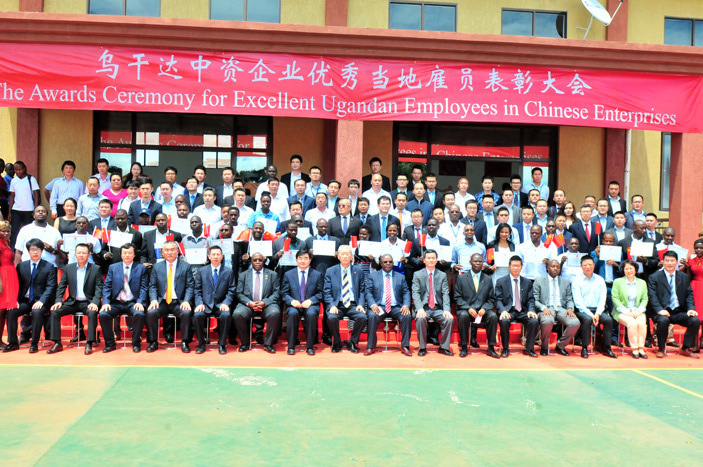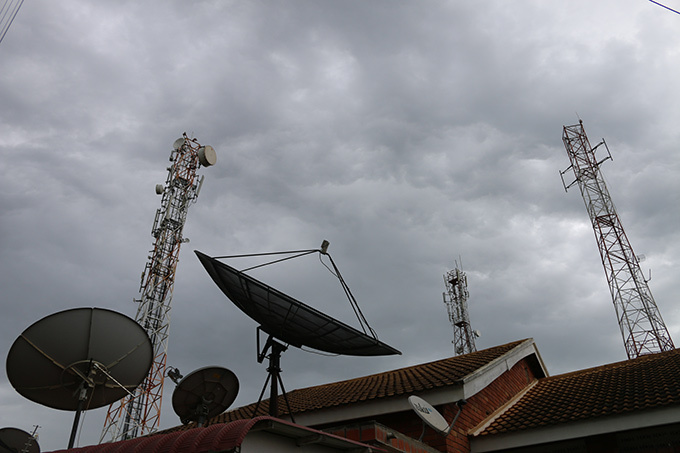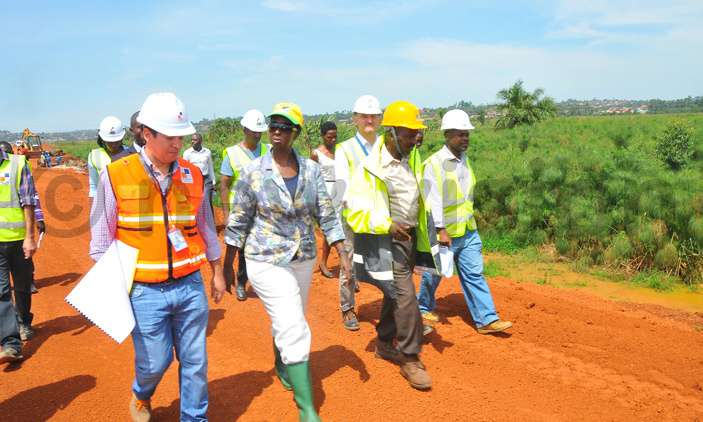How Chinese grapple with language barrier in rural Uganda
As a solution, narrates Lin, most Chinese migrants verify information by “engaging more people on the same issues,” and also, “some Chinese have lived in Uganda for long. We usually ask them to brief us on the current affairs.”
A Chinese buys roasted maize from a vendor on the roadside.
Although he works and lives in Kyenjojo, a rural part of western Uganda, Wu Lee, a Chinese engineer is not completely isolated from the rest of his nationals living in Uganda. He is connected to them through media, including social media.
Nevertheless, he is delinked from the members of the local community in which he lives — the people he has daily interactions with. Regularly, he walks through villages and urban centers in Kyenjojo swiftly, solitary and almost noiselessly.
Reason? Communication barrier!
"Communication in rural parts of Uganda is not easy. People don't know English. We don't know it too. We have to communicate through third parties," narrates Wu Lee, who is part of the Chinese tarmacking Kyenjojo-Kabwoya Road. Lee has spent about a year in Uganda.
"Dealing with information in a new land is considered challenging for immigrants," argued Safirotu Khoir, Jia Tina Du and Andy Koronios in their 2015 study about information sharing in community associations: Asian immigrants' experiences.
"Their adaptation process, including how to seek and share information, usually requires support from several sources."

A number of Chinse companies in Uganda employ Ugandans. In this picture, some of the best employees were recognized.
And for the Chinese working in rural parts of Uganda, the challenge is real; even though some speak English, the host communities may not. And so they remain isolated.
To come out of such seclusion, Liu Lin, country director for China Geo Engineering company tried to learn Luganda — the most widely-spoken Ugandan language, but all in vain.
"I have been in Uganda for the last seven years but communication is my biggest challenge. Most programs on radios and television are in local languages," he says.
Likewise, Yechen Wang, the spokesperson for China Railway Seventh Group, a Chinese company working on Mbarara northern Bypass Road acknowledges facing a similar problem.

Vision Group Mbarara Bureau Office. The presence of several media platforms in Uganda is rendering the flow and access to information affordable and simple to digest but not by all.
He says Chinese in Uganda need local news to, "understand the local situations" so they can effectively integrate into the, "local communities and experience their cultures," and short of this, they are delinked from community members.
Access to information is a foundation for informed choices and decision-making.
This is the reason why Wang contends that access to information about issues such as local norms and traditions; weather, sports, entertainment and food prices in a form they understand could help the Chinese migrants in the country to, "improve their work relations with local communities."
Unfortunately, like Ufrieda Ho, a daughter of Chinese migrant in South Africa, describes in her 2011 Paper Sons and Daughter Memoir, how it felt for her and parents living in South Africa in 70s and 80s, the Chinese migrants in rural parts of Uganda, seem "separated in delineated living spaces," staying in their "boxes of stereotypes, convenient prejudice and simmering tensions." And so, they are not able to engage in local social activities.
China is the leading country investing in Uganda's economy. Data from Uganda Investment Authority indicates that the Asian country topped the list of five foreign direct investment sources in Uganda for the last three years.
The establishment of these investments brings with it more Chinese migrants into Uganda. There are about 50, 000 Chinese living in Uganda.

Uganda National Roads Authority (UNRA) boss Allen Kagian inspects a road under constriction by a Chinese contrator.
The presence of several media platforms in Uganda is rendering the flow and access to information affordable and simple to digest but not by all. The reason advanced to this is the high costs involved in news gathering and dissemination.
For example, Deus Ruhangariyo, the editor for Orumuri, one of the leading vernacular newspapers in the country says, his paper would not be able to "print out pullouts" written in Mandarin or Cantonese if such sections of the newspaper are not "sponsored because of the expenses involved."
But with increased teaching of mandarin in Uganda, Abas Mugisha, a don at Kabale University and PhD student argues that challenges related to information sharing between Chinese migrants and local communities in Uganda will, "soon be history."
Teaching of Chinese in Uganda was intensified by Makerere's Confucius institute in 2015 and now several schools round the country teach it as a foreign language.
As more schools and institutions of higher learning in Uganda teach Chinese, argues Mugisha, "Chinese language is becoming more popular," which increases "Chinese translators" in the country, providing a good opportunity for the Chinese migrants and local communities to connect.
But Wuyi Lin, who is part of the Chinese tarmacking Kyenjojo-Kabwoya Road, is cautious about local translators. "We hire translators to translate for us. We have been staying in the camp since last year but at times we don't get right information. They lie to us."
As a solution, narrates Lin, most Chinese migrants verify information by "engaging more people on the same issues," and also, "some Chinese have lived in Uganda for long. We usually ask them to brief us on the current affairs."
As China increases its investment in Uganda, the need for swift flow of information between the Chinese migrants and local communities is ever-more urgent to enable development of constructive relationships.
This article was produced with support from the China-Africa Reporting Project in the Journalism Department of the University of the Witwatersrand in South Africa.